A government official approaches a promising young electronics engineer and asks him to make an easily affordable mass-produced radio, to be available in several price options with a government-backed instalment plan option to be made available even on the cheapest models. The engineer, Otto Griessing, worked wonders and the radio was housed in a striking black Bakelite case, a real design classic. A massive hit with the public, units flew off the shelves and it became a ubiquitous symbol of its’ time and country; what could be more democratic? Forty two years later a German group used a picture of one on the front and back cover of their latest LP. The group was Kraftwerk and the album was Radio-Activity*.
The LP title was a wry play on radioactivity and activity on the radio and although it doesn’t boast the big statement pieces like the title tracks of Autobahn and Trans-Europe Express, I would argue that Radio-Activity‘s clever balance of the experimental and the pop hemispheres of Kraftwerk’s big collective digital brain make it one of their very best.
First up the production of Radio-Activity is brilliant, Ralf Hütter and Florian Schneider created a warm, clear soundscape that at times sound like a dimly remembered soundtrack to a 50’s sci-fi film and occasionally still sounds like the future. The synths can sound crude and a little dated by today’s standards, but like all the hip new analogue synth fetishists around now have come to grok their imperfections are what give the album a welcoming, more human, more humane aspect, rather than a purely mechanical sheen.
Radio-Activity starts with the clicking of ‘Geiger Counter’ which almost morphs into a techno beat 14 years too early, but instead demurs and segues into the stately, achingly sad, ‘Radioactivity’; probably my favourite Kraftwerk track period. I get fascinated by that precise junction between man and machine, that point where mood and emotion are created from purely electronic instrumentation, or at least where we start to perceive such things. My own personal theory is that as humans we are constantly seeking to relate to the world around us on our own terms, we irrationally grant inanimate objects feelings/motives/emotions all the time – anyone who has ever pleaded with a PC printer to work this time, slapped a wardrobe door in revenge after catching your head on it, or demanded to know precisely what a skipping car CD player has against you, should be able to relate. So we are already primed and receptive.
But, of course not everything here is electronic we are also responding to the voice, on ‘Radioactivity’ it isn’t vocodered, or vortraxed into the realms of Teutonic androids. The lyrics, mixing German and English are a treat and, as often is the case with Kraftwerk they make me smile,
Radioactivity
Is in the air for you and me
Radioactivity
Discovered by Madame Curie
They also get 1537 bonus points for incorporating the group’s name in Morse code in the track – I really think Morse code is underused in popular music. I mean, ‘Let It Be’ – great song and everything, but it could so easily have been improved by 27.9% by substituting the word ‘Mary’ for ‘– .- .-. -.–‘, true story (click to hear). But I digress.
‘Radioland’ is another excellent track, slow and slightly otherworldly, the synths kling and klang phasing in and out to give the effect of half heard, half-obscured signals, possibly from the future back in 1975. It’s possibly all completely lost on the youth of today, but anyone who’s lain awake in the dark working their way through the dial of a radio, listening to snatches of music, speech in a variety of tongues and all that interesting static wow and flutter, is taken right back there. An effect further backed up by the shorter atmospheric pieces like ‘News’ and ‘Intermission’.
The closest Radio-Activity gets to pop is ‘Airwaves’, a nifty little mover that ghosts past you borne along on knitting needle percussion and the sole line, ‘When airwaves swing / Distant voices sing’. As with so much by Kraftwerk the line could mean everything, or nothing at all – they deliberately surf that ridge between banality and profundity perfectly. I am also a bit of a sucker for the 1 – 2 killer combo of the sinister ‘The Voice of Energy’ and the harsher, more experimental sounds of ‘Antenna’; you can hear whole careers, whole genres even being birthed right there on side 2 of this LP*^.
‘Radio Stars’, another entry in the Kraftwerk pun book, is an interesting one for a band who were starting to find a degree of fame and US airplay. The stars in question are astronomical, not musical, their classifications Vortraxed over an unrelenting high-pitched pulsing. You get a sense that these are the only stars Kraftwerk felt were notable and worthwhile, which points us back to the meanings of the LP title. Whilst knowingly playing up to certain Germanic archetypes at times, Kraftwerk were trying to find a mode and form of expression that was uniquely theirs and like most young artists in Germany at the time, trying to find a means of national expression that wasn’t overtly nationalistic. Some of the trappings of massive popular success would have looked somewhat ominous – adulation, a sheep-like uncritical following, cults of personality, the wages of this taken to an extreme would have been all too apparent in 1970’s Germany. Plenty of artists have looked at the fascistic overtones of big gigs and fan worship since^, popular culture as a means of control.
Does this stretch credibility and taste a little too far for you?
Well, remember the radio that graces the cover of Radio-Activity? the government official that commissioned Griessing to develop it was Joseph Goebbels. The radio was called the Volksempfänger (literally, ‘the people’s receiver’). The Nazis realised the unique power of having a voice in the home of as many German citizens as possible, Albert Speer cited it as a means of depriving the populace of independent thought, a means of suppressing people and shaping their thoughts and ideals^^.
Be careful who you make radio stars.
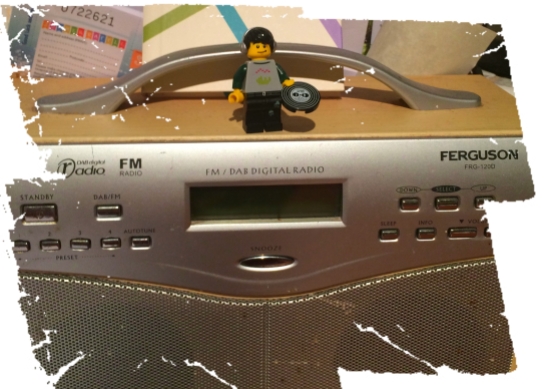
574 Down.
PS – I’m in the process of buying a deutscher kleinempfänger 38 myself, although I may have to have it restored.
*or Radio-Aktivität in the original German edition.
*^New Order ‘Blue Monday’ and Chemical Brothers ‘Leave Home’ (mighty tracks, both) sample ‘Uranium’ and ‘Ohm Sweet Ohm’ respectively.
^I’m thinking about you David Bowie and Pink Floyd’s ‘In The Flesh’, particularly.
^^pinched from Wikipedia, the text translates as “All of Germany hears the Führer with the People’s Receiver”:
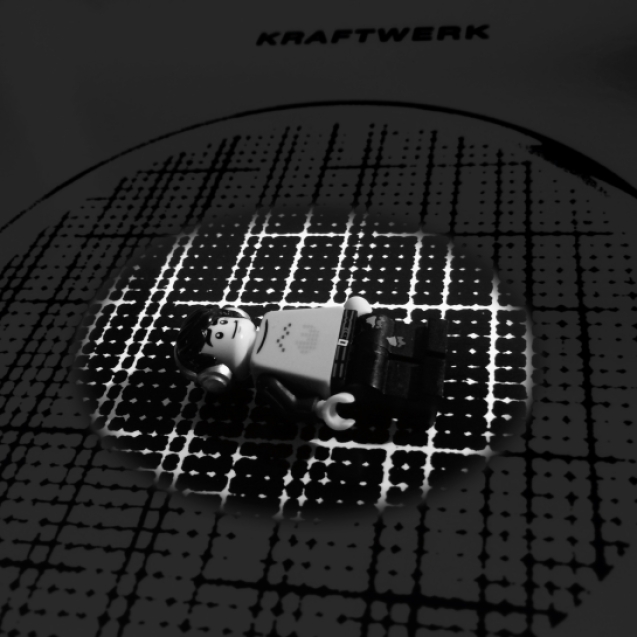
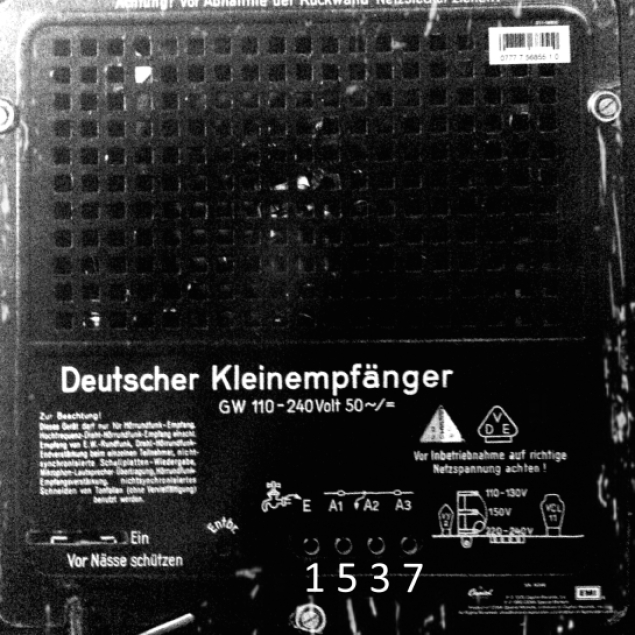

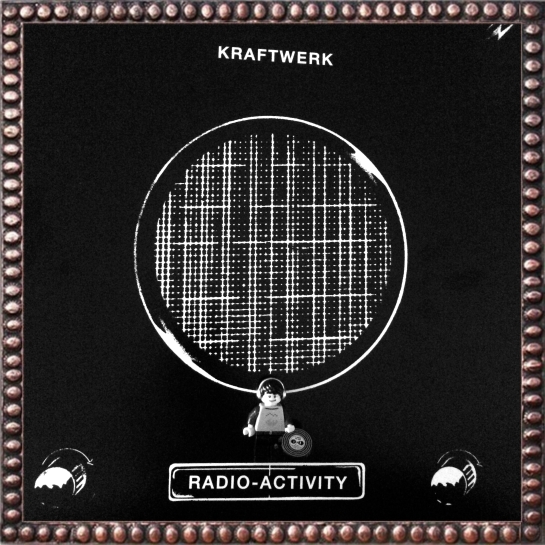


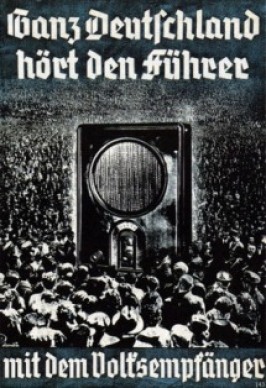
Love that Madam Curie lyric!
Helped me in a pub quiz a few weeks ago too. True story.
Very good sir knight! I love when music lyrics do that. I impressed my grade 10 teacher because Black Sabbath told me what a “funeral pyre” was. I didn’t tell the teacher I learned it from Black Sabbath 🙂
And the covers of various grind core LPs have done wonders for my knowledge of anatomy too!
There ya go, see?
Outstanding post, sir – loads of stuff in there. I really dig this one and, if I’m not wrong, it remains the only album of theirs l still have.
Thank you very much. It’s not an original thought of mine but there’s an argument they changed music more than the Beatles did. Man-Machine is possibly my all-timer though.
I’ll jump on that bus – I’m sick of folks rambling on about how that Beatles lot changed the face of music!
Man, try working in Liverpool …
Knowing how long this post has been gestating for you Joe, do take enjoyment in having nailed it. Fantastic contextualising, unique insights, just a little eyelid flutter to generate intrigue… marvellous.
When I saw Kraftwerk live in 2005 (and indeed on the concert DVD) I was struck by how they have sinistered up the song ‘Radioactivity’ both musically and lyrically. The repetitive chant really changes the tone and message…
Tschernobyl, Harrisburgh
Sellafield, Hiroshima
Tschernobyl, Harrisburgh
Sellafield, Hiroshima
Stop radioactivity
Ha, some eggs take longer to hatch than others!
Thank you very much Bruce, another friend of mine saw them at an anti-nuke gig in the early 90s and said the same, it was a real protest song. For once though I’ll take that aching desolation over anger. Wow, is this a sign I’m not an (overgrown) adolescent anymore?
I didn’t know Kraftwerk at all except for the name, so as I read this post, I listened to snippets of the album on the Tubes of You. You nailed it.
Thank you, I really love Kraftwerk and I find their stuff to be very emotional.
Thank you for introducing me to the morse code site!
Always appreciated this US Office tribute to the, as you astutely observed, underused method of communication: https://www.youtube.com/watch?v=fWCQgLLtM_w
Another vastly-overlooked for of communication (start the video at 1:03 to ignore the intro)…
Nice – that’s a new language to me, time to invest in some signal flags!
Brilliant -not seen that for 30 years!
I’ll check it when I get home. Maybe we should henceforth produce all our posts in Morse code?
-.– . …
How dare you! I’m a married man!
And here we thought this was a talking-head Lego-operated blog!
This was my working theory as well.
Kind of like The Wizard of Oz.
Yup, that’s me – all smoke and mirrors, with an insignificant dweeb working the levers behind the curtains!
Hmm…my intention was something along more flattering lines. I guess it’s been a while since I’ve seen the movie 🙂
I’m sorry I was so forward!
We know that you’re a gentleman, Geoff!
(Blinks rapidly)
Damn. Informative and poignant. And I had no idea Radioactivity came out before Computer World. Another Kraftwork record I must own. Must I say!
My middle names are Informative and Poignant. I love this one, it’s such a sad LP.
Interesting post, Joe. I especially like your intro. Morse code! The blogosphere needs more. I also enjoyed the casual mention of Joseph Goebbels — I stopped and re-read. Nicely written :). Oh, and the music. I will seek out the music!
Thank you very much. Maybe an all Morse code post next time?
I was fascinated how even an innocent seeming action like producing cheap radios, could have sinister motives. Of course a lot of Germans used them to find out what was going on outside Germany at the time.
Seek out the title track, go on.
That would be a first! You’ve got an audience that would appreciate it.
Yes, it takes an understanding of the potential power of mass-communication and propaganda. Sinister and fascinating.
I shall seek!